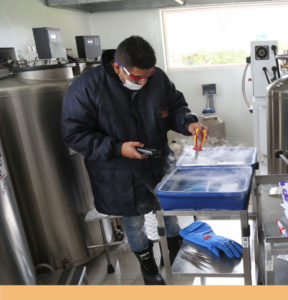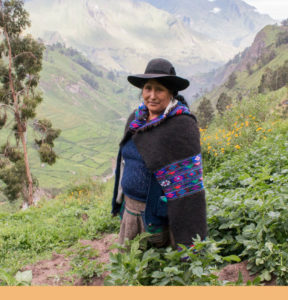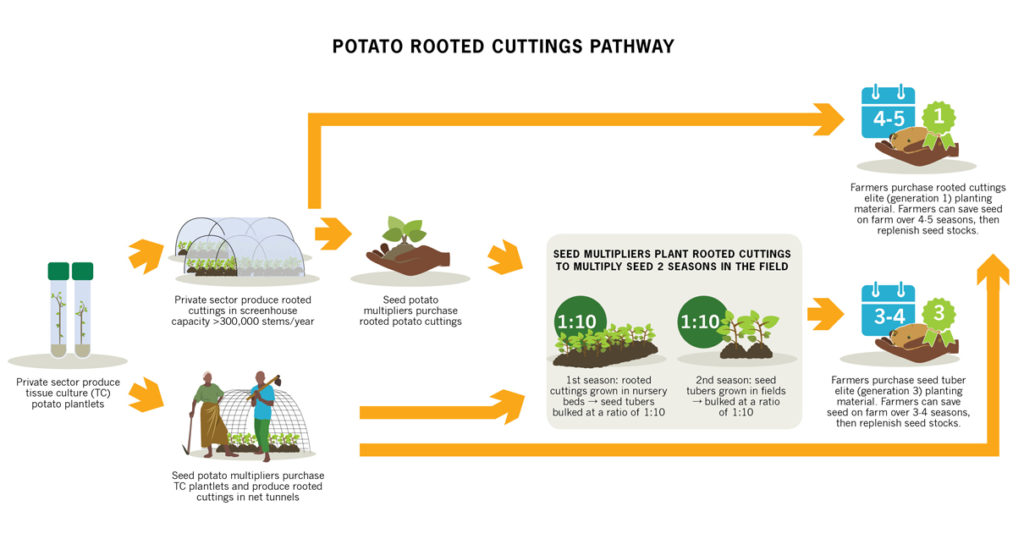New seed technology increases yields and incomes
The potato value chain in Kenya employs around two million people and contributes approximately USD 500 million to the annual economy. Yet farmers’ access to quality seed, critical to the value chain, is limited due to low supply. Apical cuttings are set to change this thanks to an initiative led by the International Potato Center which has put clean seed into the hands of 50,000 farmers in Kenya so far, boosting yields and incomes by as much as 50%.
Potato as a ‘root’ out of poverty
The potato value chain is of critical importance to the national economy of Kenya and to the two million people who depend on its value chain for their livelihoods and food security. Yet the estimated 800,000 Kenyan potato farmers lack access to quality seed meaning they often recycle seed from earlier harvests or buy them from unregulated markets.
“Potato is a poverty buster, but it is not achieving its potential,” says Monica Parker, a senior scientist with the International Potato Center (CIP) in Nairobi. “Increasing farmers’ access to seed of known quality can bring so many more benefits, but there is just not enough to go around.”
Promise awaits in the form of a technology called rooted apical cuttings – small plantlets that are used to produce high quality seed for farmers. Early returns have been encouraging.
“Using high quality of seed produced increases yields and incomes by as much as 50% and even greater, particularly when combined with farmer training on how to better manage seed recycling and soil health.”
One potato, fifteen potatoes, 2,000 potatoes… more!
Rooted cuttings are produced in a screenhouse from tissue culture plantlets grown under controlled sterile conditions to ensure they are disease-free. Each such plantlet can produce more than 100 rooted cuttings (Figure 1). The cuttings are then bought by seed producers who multiply the seed in the field: each cutting produces 10-20+ tubers which after a further round of multiplication can be sold as certified seed to farmers. Rooted cuttings can be sold after just two seasons of multiplication compared to conventional multiplication that three or four seasons.
“It’s a win-win situation” continues Parker. “From a tiny little trial with the national program, now we are creating opportunities for businesses here in Kenya, including young and women entrepreneurs in rural communities. These businesses are also the means to reach our end goal – getting quality seed to farmers. Right now, we have around 50 successful businesses producing seeds that are reaching and benefitting 5,000 farmers. It is amazing to think that one tissue culture plantlet can deliver around 2,000 seed tubers.”
From the screenhouse to the nursery to the farm
“It is not just about producing the cuttings, it is also about using them to produce,” explains Dinah Borus, a senior research associate with CIP. “Apical cuttings have the potential to reduce the potato productivity gap but only if farmers can access seed, and even use cuttings directly. The first step was to get seed producers to try them, validate the technology, and help spread the word.”
“Rural farmers are buying cuttings directly from rural nurseries to produce their own seed on farm thereby reducing their seed costs by half if they multiply the seed once and by five-fold if they multiply the seed twice,” says Parker. “This model creates another option for farmers to access seed.”
Sprouting new business shoots
Much of the success for this innovative approach is owed to a successful engagement with two private sector partners: Stokman Rozen Kenya and AgroMax (Uganda).
“Rooted apical cuttings are innovative, cost-effective, and easy to adopt,” says Ronyjo Oved, the CEO for Agromax. “It opens new horizons to the potato industry in Uganda and will enable us to expand our operations to serve farmers outside the country.”
The impact on rural livelihoods has been immediate. “I started with a 50-kilogram bag of seed potatoes, and I saw my yield increase by 280%,” says farmer-turned-seed producer, Cecinta Nduru. “Then I took training to produce my own clean seed from cuttings. Now I make a good living selling seed in my community and I am training other farmers on how to become seed producers.”
Looking ahead
The apical rooted cuttings program is starting to scale out in India, where it has the potential to reach millions of farmers and help potato farming reach its true potential for the millions who depend on it for food and livelihoods.
Potato pathogens, like late potato blight disease, cost developing countries USD 10 billion every year annually and reduce the amount of food available to eat. Getting disease-resistant and water-stress tolerant varieties to farmers is the first line of defense against global challenges like malnutrition and climate change, and central to the new research and innovation strategy of CGIAR. For potato, there is now an extra tool in the arsenal – rooted apical cuttings.



